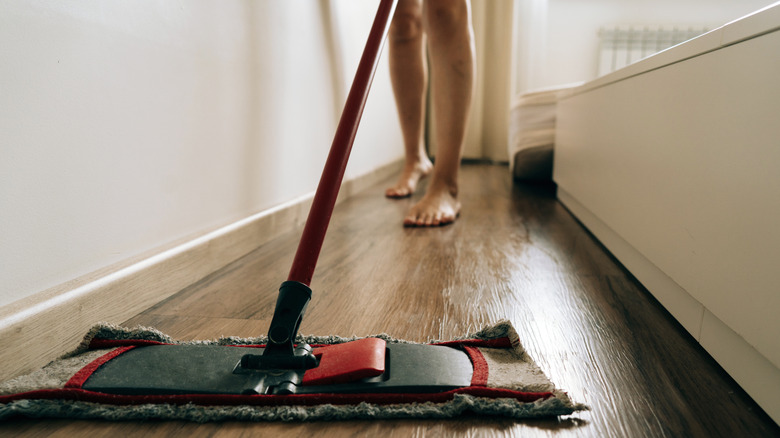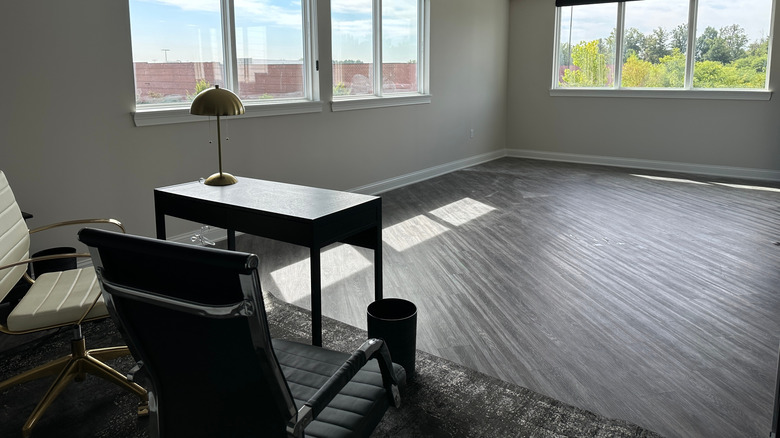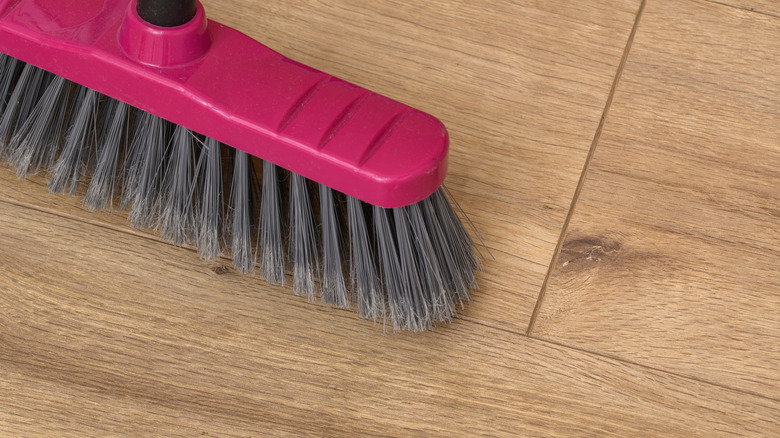The Common Product You Should Never Use To Restore Shine To Vinyl Floors
Most of us are probably overthinking our vinyl floor care regimens. And if we're not overthinking them, we're certainly overdoing them. These floors are incredibly resilient and easy to clean and maintain, but everyone makes mistakes when cleaning their vinyl floors, and a couple of common products as well as the pull of tradition might be causing us to do exactly the wrong thing. House Digest spoke exclusively about this problem with Jim Mannes, Total Care Director for Shaw Floors, and he agreed that most floor-cleaning products aren't properly formulated for use with vinyl floors.
Products like floor waxes and solvent-based floor polishes are among the things you should never use on vinyl flooring, as they often leave floors duller than they would be without them. "The challenge with these products is that rarely are they rinsed after use and thus leave a film or residue that causes the floor, over time, to become sticky and attract soil," Mannes said. He encourages vinyl floor owners to think of floor-cleaning like other types of cleaning: "Remove gross debris (dry soil), apply chemistry (detergent), agitate, allow proper dwell time for the chemistry to do the work," he said, "and then the final step is rinsing. Most often, we skip the most important last step. Think of your laundry, dishes or even washing your hands, the last step is rinsing." Without the rinsing step, you're left with residues that tend to dull your floor's shine.
Avoid wax and solvent-based polishes
Marketing tactics, tradition, and plain ol' misguided "common sense" can come together and cause us to make bad decisions about which products to use when cleaning vinyl floors. In fact, sometimes you don't need any chemical product at all to do the bulk of the work. When House Digest spoke exclusively with floor expert Jim Mannes, he told us that the allure of floor cleaners with a "restorative chemistry" is strong. "Most manufacturers do not recommend any products that contain wax, optical brighteners or chemistries that are non-compatible with their products," Mannes said. "The reason why these wax-based products are not ideal is that they simply don't adhere well to the floor."
The other vinyl floor no-no is using solvents that aren't recommended by the flooring manufacturer. "The use of solvents is typically not recommended or needed," Mannes explained. "Solvent based cleaning products are not easily rinsed and can leave unwanted residues and 'haze.'" Cleaners with a neutral pH that are specifically designed for vinyl flooring, and which don't make promises about restoring your floor's finish, are likely to be safe for your floor. Mannes actually recommends using a rag and isopropyl alcohol to clean up oily, waxy, and other spills that resist your normal cleaning routine. But, surprisingly, he says that properly cleaning vinyl flooring starts with no liquids at all.
How to restore your vinyl floor
Perhaps something about vinyl's impenetrability makes us think we should be sloshing water and liquid cleaners all about the place. But when House Digest asked Jim Mannes about it in an exclusive conversation, he told us that 80% or more of floor soil is dry particulate matter, and that adding a liquid to that mix only makes cleaning more difficult. "Dry soil removal is the first critical step with a vacuum followed by a dry microfiber mop," Mannes said. Dry mopping on a consistent basis is a quick and easy way to remove the very fine soils that a vacuum or broom doesn't address. After dry methods are employed, the use of damp mopping is appropriate." And when you do dampen that mop, pay attention to what you dampen it with. Mannes recommends using distilled water because the dissolved minerals found in most well and treated water remain behind after mopping, and build up over time to leave you with a floor that looks hazy.
When it's time to attempt to restore the finish on an older, worn floor, Mannes reiterates that it's crucial to follow manufacturers' recommendations and choose products and cleaners that are safe for vinyl floors. "Some manufacturers offer a finish restorative product ... that will give some improvement to the overall aesthetic appearance of the floor," he said. And be sure to test any product on an inconspicuous area to make sure you're okay with the glossiness of the new finish.


